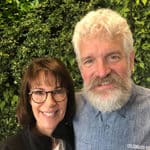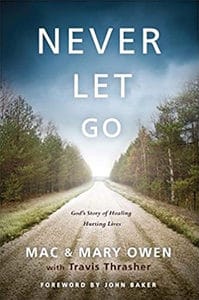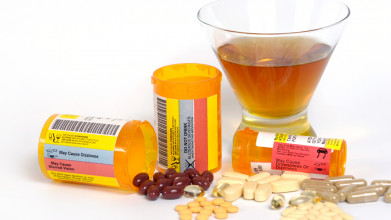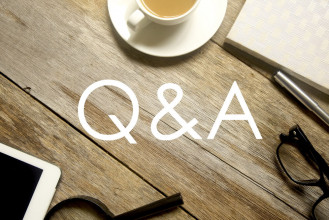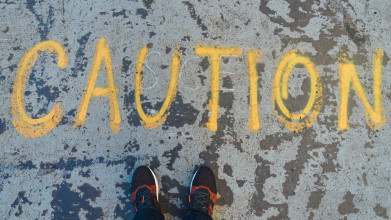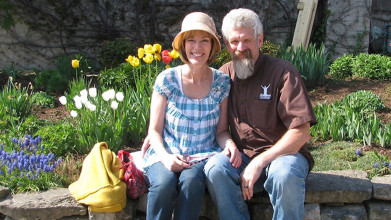Preview:
Mac Owen: Well, you know, we hear people especially in Colorado now, say that marijuana is not a gateway drug. And that’s fine if people wanna believe that, but for me it was. And everybody that I ever knew that was on meth, started with marijuana.
Jim Daly: Right, right-
Mac: (laughs) So-
Jim: … I think the evidence is pretty strong that it is.
Mac: … right, right.
End of Preview
John Fuller: That’s Mac Owen, describing his own painful and nearly destructive journey with drug addiction. And, uh, Mac and his wife Mary are back with us today on Focus on the Family. Your host is Focus president, and author Jim Daly, and I’m John Fuller.
Jim: Uh, John, we had a powerful conversation last time with Mac and Mary, who grew up right in the middle of the drug revolution that gripped this nation during the ’60s and ’70s. And even though they came from loving Christian homes, uh, they were drawn to a party lifestyle at that time. And would leave their youth group, uh, to join their friends in drinking and smoking marijuana, and even experimenting with harder drugs. Uh, that was a normal part of their everyday life. But underneath all of what they considered fun and getting high were feelings of guilt and shame. Especially for Mary who had been taught since childhood about giving her life to the Lord and following him day-to-day. Uh, tragically, I think many Christian families struggle with these same issues now. There’s a growing momentum in the US to legalize drugs, especially marijuana. And we’re already seeing the harmful consequences in traffic deaths, overdoses, and simply what, uh, marijuana can do to your apathy. You’re just not motivated to get out there and pursue productive lives.
John: Hmm. Well, we are hearing from a lot of parents who are rightly very concerned about their teens and young adults who are at risk. And of course, we’re here to help if you’re dealing with this kind of an issue. We have Christian counselors who are available to pray with you and direct you to resources. And, uh, the number to call to reach them is 800-232-6459. Or we’ll have a link for our counseling team at focusonthefamily.com\broadcast.
Jim: The good news is there is hope. And Mac and Mary have documented their story in a book called, Never Let Go: God’s Story Of Healing Hurting Lives. And we wanna pick up the story right there. And let me say Mac and Mary, welcome back to Focus on the Family.
Mac: Thank you.
Mary Owen: Thank you.
Jim: Um, l- let’s go here, uh, we mentioned last time, that you almost died of an overdose. Uh, uh, tragically, you had mixed two drugs. Paint the picture of what happened, because this again, as we said last time, is one of those moments where God got your attention obviously. The last was when you, uh, went to get drugs and you had your two daughters in the car. And that just made an impact on you about the danger of it. Describe what happened here, where you felt like this could be the end.
Mac: Well, most addicts have a fairly grandiose type of thinking. And, um, if a little bit is good, then a lot must be better. And so, at this point in my addiction, I had moved to doing something I said I would never do, and that was injecting drugs.
Jim: Hmm.
Mac: I was scared of needles, I said I’d never do that, but a friend introduced me to it, and I thought, wow, this is really good. And so, it took me to that next level. And then another friend said, “You know, if you do meth and mix a little cocaine with it, it’ll even be better.”
Jim: Mm-hmm.
Mac: Well, I did that, uh, and unfortunately, people in the addiction end of life don’t realize that we’re not dealing with Dal Pharmaceutical-
Jim: Right.
Mac: … we’re dealing with people who make this stuff in a bathtub somewhere.
Jim: Right.
Mac: And so, I got some drugs, some cocaine and some meth, mixed it together, and, uh, at the point I injected it, uh, my heart, I could feel it just stopping.
Jim: Hmm.
Mac: And I f- I was on the bathroom floor, just laying on the floor, could not get up. After about 15 minutes, I crawled into the living room, crawled up on the couch and sat there f- or laid there for about the next two hours until Mary came home. And at that point, I had- I realized that I wasn’t going to die, or didn’t think I was, but in that period until Mary came home, that two hours, I thought the whole time I was gonna die.
Jim: Hmm.
Mac: But again, at that point, that’s when God in his clear, small voice-
Jim: Right.
Mac: … said, “What are you doing? What are you doing?” And I heard that, but I still chose not to really listen to it. I heard it but I didn’t listen to it, if that makes any kind of sense?
Jim: Oh, it does, yeah, I get that. And I wanna make sure people listening, this isn’t about lifting up the life of, uh, a drug addict at all. I mean, uh, this is a breaking process-
Mac: Mm-hmm.
Jim: … that you’re going through. Let me ask the question that probably in your recovery program that you lead, um, is often a question that an addict will ask, “Why am I doing this to myself? Why?”
Mac: And- and to that there is not a good reason, or a good answer to that question. Other than the fact it starts out fairly innocently.
Jim: Just a good time.
Mac: Good times with some good friends, and then before you know it, it ends up at a place where you can’t stop. It- you- your body… And- and I don’t… This is my own belief but I don’t believe this is a disease, I believe this was a choice that I made. But by this time in my choice of using drugs, my body was saying, “You can’t live without this,” because it had become a part of every one of the cells in my body.
Jim: Yeah.
Mac: And so my body craved it, and so, I needed more and more. So, again, it wasn’t that you know, that thing where I woke up one day and said, “I’m gonna be an addict.”
Jim: Right.
Mac: That almost-
Jim: Nobody does that.
Mac: … no, nobody does that. And it- it almost happens unaware and overnight.
Jim: Yeah.
Mac: You wake up and you- your body craves it so bad.
Mary: Well, I think some people fro- from us being in recovery for so long, all the stories that we’ve heard, a lot of times people will start smoking part of this or drinking or whatever it is that they start doing, is because they have this pain. There’s some kind of pain in their life that they wanna numb. And this numbs that pain where they don’t have to think about it anymore. But then, all of a sudden, that little bit they did that doesn’t work anymore, so they have to take a little more to numb it again. And that’s kind of how it starts.
Mac: Right, it is to, uh, escape that pain that they’re feeling, maybe something happened in childhood, et cetera.
Mary: Yes, yes.
Jim: Mac, you then… Uh, Mary’s going to church, you have an encounter with your daughter I think-
Mac: Mm-hmm.
Mary: Mm-hmm.
Jim: … it was Callie.
Mac: Yeah.
Jim: And she said something… I think she was only four years old-
Mary: Mm-hmm.
Jim: … if I remember the story correctly. Describe what went on and how this was now the third, uh, uh, event that I’m aware reading the- the book.
Mac: This was the third and breaking point in my life. Um, where I had been awake for a week-
Jim: Oh geez.
Mac: … and that’s, I mean, literally, had not been asleep-
Jim: Hmm.
Mac: … for seven days. It was a Saturday night, I came in early probably five or six o’clock in the morning to go to bed Sunday morning while they went to church.
Jim: Right.
Mac: And so, I came and got in bed, just hoping that they would leave me alone, not say anything to me, and just- I- I just really at that point, knew I needed some sleep. Well, our youngest daughter Callie came in the bedroom as Mary was getting ready in the bathroom. I’m laying in the bed, Callie comes in, stands beside the bed and looks at me but talks to her mom. And said, “How come daddy doesn’t do anything with us anymore?”
Jim: Hmm.
Mac: “How come daddy doesn’t go to church with us anymore?” And in that moment I heard that, but Mary, who was at this point a classic co-dependent, and didn’t wanna ruffle the waters in any way, uh, said, “You need to leave your daddy alone, he’s been working hard, he needs some sleep.”
Jim: Hmm.
Mac: And she said, Callie said, “Well, if he’s not going to church, I’m not gonna go either.”
Jim: Hmm.
Mac: And that’s what I heard. In that moment, God told me I was not only killing myself but I was killing everybody I claimed to love. And I would say everybody that I loved, but if I really loved them would I be doing the things that I was doing? So, all this conflict was going through my mind right now, and I just said they just needed to leave. So, I just acted like I didn’t hear anything and just waited for them to leave.
Jim: Hmm.
Mac: When they left, God used that little girl that morning to break my heart.
Jim: Hmm.
Mac: I went outside immediately, got all my drugs, paraphernalia, everything, went outside and burned everything, ’cause I knew if I didn’t, I would use again. So, I said, I’ve just got to clear the house of everything.
Jim: Yeah.
Mac: So, I went and got everything out of there, came in and I started writing Mary a letter. And remember now, I still haven’t been asleep- (laughs)
Jim: Right.
Mac: … for a week. But I started writing her a letter and telling her everything that I’d done. And what I’d been doing and was there any way that she could ever forgive me and that we could have a normal life. I just remember writing all that stuff down.
Mary: And so, I left for church with the girls and I was just- I was crushed, because I thought- I thought I was keeping it a good secret from our kids. And that they weren’t knowing that me and their daddy weren’t getting along really well. And so I went to church that morning and the last song of, um, the day… Well, actually the sermon was on confession and how good it is for the soul.
Jim: Oh my goodness.
Mary: And I was like, oh man, I wish I could tell somebody what all is going on in my life. And the last song of the day is, It Is Well With My Soul.
Jim: Mm-hmm.
Mary: And I thought- I couldn’t even sing it, and I said, it’s not well with my soul, it’s not well with our kids and it’s not well with Mac. And I just wanted to run out of the building.
Jim: Hmm.
Mary: And I cried the whole way home. The girls were singing church songs in the back of the car and just happy. And I get home and I see him sitting in his recliner, and he had this yellow notepad in front of him, and he’d been crying. And I hadn’t seen him ever cry before-
Jim: Hmm.
Mary: … since we’d been married.
Mac: Because real men don’t cry.
Jim: Right.
Mary: That’s what he thought, yeah. And so, um, he said, “I- I need to tell you something.” And so, he started telling me what all he’d been doing and I was just- then I was like, “I’m just thankful to know what is going on with you.” I said, “Let’s call our pastor and let’s get some help now.”
Mac: And, uh, you know, I- I will say that that was the first time I could remember crying, really crying.
Jim: Yeah.
Mac: And what I found in those tears that morning was relief like, I’d never known in my life.
John: Hmm.
Mac: It just flooded over me.
Jim: Yeah. Wha- what- I mean, I think I understand the core of that transition, but if you can elaborate on it for me? I mean, was it the fear that you were going to lose your family? The fear that you were in many ways crushing your family? That your daughter would never know God because of your behavior, all of that, or what am I missing?
Mac: It was all of that, and the fear that I would be lost forever.
Jim: Okay.
Mac: That finally came into the picture.
Jim: Okay.
Mac: So, my daughter who got used to break my heart that morning, was the- the catalyst for me saying, not only am I gonna lose my family, I’m gonna lose me.
Jim: Yeah.
Mac: And so, uh, when Mary came home that morning and said, “Could we talk to the pastor?” My first response was, (laughs) “Well, I already told you I’m changing, what more do you want me to do?”
Jim: So, you thought that was a sufficient good first step-
Mac: Uh, I wrote a letter-
Jim: … now stick with me.
Mac: … and I said, “I’m changing, yeah, let’s go.”
Jim: And that leads into even the rehab. You entered a program-
Mac: Right.
Jim: … but you weren’t convinced that you really needed it, which is also, kind of addict behavior.
Mac: Right.
Jim: I mean, some people aren’t quite there yet. “I- I’m functional, I can do this. I’m making progress, don’t bug me.”
Mac: Praise God and the Holy Spirit, that Mary was being directed by the Holy Spirit. Because she stepped out of her co-dependency and said, “I don’t care what you said, we need to talk to somebody.
Jim: Oh that’s good.
Mary: Yeah.
Mac: And so, that’s when the pastor came over, uh, that afternoon, and met with us. And said, “You know, you don’t have to tell the rest of the church this.” Because again, I would show up at church enough that everybody thought I was a faithful member too-
Jim: Yeah.
Mac: … just because of my attendance.
Jim: You were just busy.
Mac: Yeah, I was- was a busy guy, you know-
Jim: Wow.
Mac: … and so-
Mary: He helped build the church building.
Mac: … Yeah.
Jim: Yeah.
Mac: And so, anyway, the pastor came over and said, “Look, you don’t have to share this with anybody else, but if you do-
Jim: Yeah.
Mac: … it might help somebody else that is struggling with addiction too.
Jim: Yeah.
Mac: And so, that night at- at our church, I went down for an alter call and I just told them, I said, “Look, I- I’m a drug addict and I need help.” And I really thought that they were gonna tell me, “We don’t want your kind around here.” But that’s not what they did, they said, “Well, you’re our first drug addict, we don’t know quite what to do with you, but we want you to keep coming back.” (laughs)
Jim: (laughs) That was good, good honesty on everybody’s part. Yeah.
Mac: Well, I- I heard that loud and clear too-
Jim: Yeah.
Mac: … I could keep coming back.
Jim: Right.
Mac: Not that they didn’t know what to do with me, uh, but there was a little lady there that did know exactly what to do. And she came up to Mary and myself and said, “Mac, I think you need to go to AA.” And I said, “Is that like a car club?”
Jim: Yeah. (laughs)
Mac: She said, “No, that’s triple A, you need double A, Alcoholics Anonymous.”
Jim: (laughs) Oh, man.
Mac: And so, uh, along with that, she also told Mary about a rehab that she could- we could go to and I could talk to her again. And I told Mary, I said, “I really don’t need a rehab, I’m gonna do better. But if you want me to go and talk to the guy, we’ll go and talk to the guy, but you’ll see, he won’t want me to stay.”
Jim: Oh.
Mac: But I got there and talked to the guy, and of course he did want me to stay. And I said, “Well, I’ve got to go home and get my stuff.”
Mary: Well, I knew he was gonna say that, so I packed him a bag and put it in the trunk-
Jim: Mm-hmm.
Mary: … ahead of time, he didn’t know.
Jim: (laughs)
Mary: And I said, “That’s okay, your stuff’s in the trunk.” (laughs) And he looked at me like, what?
Mac: Yeah.
Mary: And so he stayed.
Jim: Yeah, no, I mean, that’s great. And all of that takes courage. Uh, Mac, you mention in the book, uh, the friends that you had that didn’t, for whatever reason… And I would like to tackle this. They didn’t heed any warnings, they didn’t get off the- the highway of the drug culture. And what happened to most of them, if not all of them?
Mac: Most of them, uh, are not alive today, which is, um, pretty tragic. You know, because these were people that I grew up with.
Jim: Yeah.
Mac: But in this- this moment of clarity that I had when our youngest daughter came in and- Callie, and talked to me, I knew at that point, that I had to separate myself from these friends.
Jim: Yeah.
Mac: And you know, that’s easier said than done when this is the people you grew up with. And so, I stopped associating with any of my old friends, but from a distance, I watched them to continue to go down this road, to- of drug addiction. And sadly enough, many of them died because of it. Uh, you know, it was ironic though, that they didn’t think less of me for getting off drugs. As a matter of fact, in years to come later on down the road, when any of them had any problems, death in the family, whatever it was, they would always call me and say, “Let’s call Mac, because he’ll know what to do.”
Jim: You became kind of lik their pastor-
Mac: Right, right-
Mary: Yeah.
Jim: … to that group of people.
Mac: … that’s right.
Jim: Oh, that’s really interesting. And you know, you- you- I’m reminded of the beginning of your story when we first started talking last time, about doing this for fun, and going to the keg party. Mary, you described that, and these people were not judgemental, everybody just seemed to be having fun. But for those listening, especially those of us with teenagers, the- the need to open up that dialogue and talk about that journey and where it most likely will end with death and destruction… So critical to have that-
Mac: Mm-hmm.
Jim: … kind of conversation. Maybe this is a catalyst for that conversation. It takes courage, but, um, one of the reasons we wanted to have Mac and Mary on was because of the power of their testimony. This is the work of God in their lives and, um, we shouldn’t, uh, bury it or hide from it. We should celebrate the fact that they chose life, not death.
Mac: Mm-hmm.
Jim: And that’s why we’re airing the program. And I know people can be critical that we don’t want to elevate drugs, and we don’t wanna you know, make that sensational. It’s not about that, it’s about teaching your teenagers particularly-
Mac: Mm-hmm.
Jim: … what it means to choose unwisely.
Mac: And I’m glad you used the word critical. I use the word vital-
Jim: Yes.
Mac: … conversation with our kids is vital, it’s life and death.
Jim: Yes.
Mac: Because that’s what’s at stake, not only their physical death, their spiritual death too. And if we don’t have a place in our homes where we can talk about anything…
Mary: Mm-hmm.
John: Oh yeah, that- it is so important to have a safe place, and the home needs to be that. Uh, Mac and Mary Owen are with us today, on Focus on the Family, sharing their dramatic story about drug addiction, and how God intervened to rescue Mac from almost certain death. Now the Owens have written about book about this experience called, Never Let Go: God’s Story Of Healing Hurting Lives. We’ve got that at focusonthefamily.com\broadcast.
Jim: Let me continue, the- the recovery time, uh, you unpacked your bag from the trunk, which was terrific.
Mary: (laughs)
Jim: Thank you Mary for thinking ahead, that’s incredible. But you did go through withdrawals. You started to feel the pain of that, meth is a terrible thing to withdraw from. And, uh, wh- describe what that was like, what was the onset like? How did it unfold for you?
Mac: Well, at first, I’ll say this. I was sleeping 16 hours a week on an average week.
Jim: Hmm.
Mac: When I got into treatment I was sleeping 16 hours a day.
Jim: Wow, yeah.
Mac: Yeah, because my body was just- it was just tired. And so, my biggest withdrawal was just finding a place where I could sleep.
Jim: Mm-hmm.
Mac: And the- the- the hospital I was in, it was a medical detox so they gave me lithium so I- because they said at this point they were afraid if I just, uh, stopped cold turkey, that I could have some heart issues, you know, cardiac arrest, stuff like that. So, they gave me lithium for about three or four days, uh, and I just slept.
Jim: Hmm.
Mac: You know, and-
Mary: They wouldn’t let me see him for a week, because they said-
Jim: Is that right?
Mary: … yeah, because they said, “He is in critical condition that you know, he might not survive this.” Because they could not believe have much he had in his body that it- it could kill him.
Jim: Hmm.
Mary: And so they said, “We- he’s just got to rest, and we’ve got to give him some medicine. And so, we’ll- we’ll let you know when you can come see him.
Mac: … But now, I will say this too, we’re not gonna rule out how God and the Holy Spirit helped me through that withdrawal-
Jim: Yeah.
Mac: … uh, with our church family. This church family that said, “We don’t know quite what to do with you,” the next Sunday when I’m in rehab, they stopped the service, and wrote cards. The- the pastor-
Jim: Mm-hmm.
Mac: … at the time said, “We’re just gonna write a card. Everybody, I want you to write a card to Mac. So, on Monday morning I got 700 cards-
Jim: Oh my goodness. (laughs)
Mac: … saying, “We love you. Here’s our favorite verse, God’s pulling for you, you’re going to make it through it.”
Jim: Yeah.
Mac: And so-
Jim: (laughs)
Mac: … I had such a love and support from this church family, I believe that it was God and his Holy Spirit working through that to help ease my addiction pains.
Jim: Yeah.
Mac: Because I- this was a 30-day program, which I’ve come to find out that most 30-day programs are a great way to take your money, they’re not a great way to get you off an addiction, you know.
Mary: Well then-
Jim: … that’s my follow up question there, because so many, uh, programs, the- the person doesn’t achieve their goal, or achieve a goal of getting off of the drugs.
Mac: That’s why support is so vital.
Jim: Yeah.
Mac: It’s got to be, uh, if you don’t have support… And that’s why, uh, I only went 19 days. After 19 days in the program, I didn’t ask to leave, they said, “We think you’re ready to leave.”
Jim: Well, Mac and Mary, uh, as we close today, I think we need those practical hand holds for parents and for individuals, who are- maybe are into drug addiction and they’re not even sure how to get out and what they can do. Uh, give us some of those practical, um, insights th- from your recovery program, and what you’ve seen with the people that you’ve counseled. What are some of those things that we need to be aware of for our own addictions as well as maybe our children or those around us?
Mary: Well- well, one thing that we’ve learned I think, through 30 years in recovery, is that everyone has some kind of hurt or hang-up or habit. You know, we’ve all been hurt, or we’ve hurt somebody else, or we’ve hurt ourselves. So, everyone has had some kind of pain at some point in their life. So, that’s what we love about the recovery program that we work with, Celebrate Recovery, is it deals with that through the 12 steps, Chri- Christ-centered 12 steps. And the eight beatitudes, we talk about each one of those, we have them as recovery principles. And so, it’s actually a family recovery ministry, where we have it for the children, age appropriate for teens, and then for adults.
Jim: Hmm.
Mary: And this is our new addiction now is seeing changed lives.
Jim: Mm-hmm.
Mary: Because we see it every day.
Jim: Yeah.
Mary: And it- it’s just so exciting to see, where someone has come before. And it might not even be a drug addiction, uh, or alcohol, or, um it- it could be, um-
Mac: Anger, co-dependency.
Mary: … yeah.
Mac: Yeah.
Mary: Gambling, whatever, you know, any- or just abuse, sexual abuse, physical abuse.
Jim: Something that takes you away from God really-
Mac: Yeah, right.
Jim: … and take- takes you away from a healthy relationship with-
Mary: Yeah.
Jim: … the Lord, in that- in that regard. And, uh, you know, again, it’s just one of those expressions of the human failing, right?
Mary: Mm-hmm.
Jim: Uh, in the fallen world-
Mac: Right.
Jim: … the sin nature that we possess.
Mac: And our nature is, when we have people in our lives, a child, uh, an uncle or whatever that has these problems, we’ll send them somewhere, they’ll get help and then they’ll be okay for us to be around.
Jim: Wow.
Mac: My suggestion is, find a Celebrate Recovery and go with them.
Jim: Hmm.
Mac: Because if they’ve got this hurt in their life and you don’t wanna be around them, then they’ve also put hurt in your lives that you need to deal with too. And so, Celebrate Recovery is in over 35,000 churches now-
Jim: 35,0000 churches, that’s great.
Mac: … in the United States, you know, and then 23 different languages it’s been translated in. Because like Mary said, everybody’s got something hurt, habit, or hang-up.
Jim: Yeah. You know, Mary, uh, and this is good to- to mention, I mean, you’re watching Mac go through his issues over years, right-
Mary: Mm-hmm. Yes.
Jim: … since you were a teenager. And- and you participated, pulled away, participated, pulled away. Began to pray, work on your own life with the Lord, yet you still needed some help too.
Mary: I did.
Jim: It’s been mentioned several times that-
Mary: Yes.
Jim: … co-dependency.
Mary: And I didn’t even know what co-dependency was at the time. I thought being a Christian meant saving others from themselves. And so, whenever he turned his life around, I was like- “Oh, it’s so exciting,” I thought. So, anybody, when we started a recovery ministry before we knew about Celebrate Recovery we had started another one. And I wanted every person to have what we had. So, I started- I- I had major control issues and I didn’t even know it. Because I thought if I can just fix them, or tell them what they need to do, then maybe they’ll get their lives straight.
Mac: Yes.
Mary: And then when I s- I finally realized you know, I can’t be anybody’s Holy Spirit, all I can do is work on myself, and say what worked for me and go with that.
Mac: Yeah.
Mary: You know, instead of trying to fix others.
Mac: Well, you actually thought, when I turned my life around, that that was the point where everything was gonna be okay, and the white picket fence, where they’d come and play, and we’d have a couple dogs and all that stuff, and-
Jim: (laughs)
Mary: Yes, I- I did. Actually I thought-
Mac: … and if I just got myself well… (laughs)
Mary: … in fact, when I went to see Mac in rehab, when I was driving across the lake going to see him for that first time, I heard a voice say, “Uh, you’re going to tell your story.” And I about had a heart attack-
Jim: Hmm.
Mary: … because I thought, I’m not telling our story to anybody, he’s just gonna get well, and we’re gonna move on with our life.
Jim: Yeah.
Mary: And then I heard it again, “You’re going to tell your story to many, many people.” I was just- I couldn’t believe it, you know, I don’t know where this is coming from, but that’s not happening.
Jim: Mm-hmm.
Mary: But look what God has-
Mac: You started going to meetings with me though too, and that was really-
Mary: … Yeah.
Mac: … instrumental in my recovery.
Mary: Yeah, yeah, at first you just went, and I thought, he’ll get fixed and we’ll be good.
Mac: (laughs)
Mary: But then he said, “Why don’t you come with me?” And so, I did, and once I started going with him, I- I started realizing, man, I’ve got some issues myself.
Mac: Yeah.
Mary: You know, I’ve- I’ve got to stand up for myself and say what I believe, instead of just-
Mac: Hmm. Well, we found other people that were inclusive too, not just the party people. We found people in recovery where ex- extremely inclusive group of people too. And they were having fun and they remembered what they did the next day, so-
Jim: Right. (laughs)
Mary: … (laughs)
Mac: … Yeah, and that’s a good thing.
Jim: It has been so good, and I know it’s going to help so many people to, uh, kind of capture them where they’re at, and make them think. Kind of like your daughter, you know, “If daddy doesn’t have to go to church, I don’t wanna go to church.” You don’t want that as a legacy.
Mac: Right.
Jim: And, uh, you certainly don’t want to see your teenagers go down that path either. So, this has been terrific, this is a reminder of what a person’s testimony, what a couple’s testimony can do to help change lives. Thank you so much Mac and Mary-
Mac: Mm-hmm.
Jim: … for being with us.
Mac: Thank you.
Mary: Thank you.
John: Well, we so appreciate your vulnerability as you’ve shared with us these past couple of days. And as a listener, I hope you’ve been encouraged by the conversation with Mac and Mary. And, uh, let me remind you that we have their book available. It’s called Never Let Go: God’s Story Of Healing Hurting Lives.
Jim: In fact John, I’d like to provide a copy of that book to anyone who is able to send a financial gift to Focus on the Family today, to help us do ministry. Uh, we need friends like you, who will support our efforts to rescue and strengthen families who are in trouble. And thanks to the generosity of our friends, uh, we’ve seen marriages saved and parents empowered to raise godly children, and so much more. But we need your ongoing support, so please be generous when you give to Focus on the Family today.
John: And you can donate and get a copy of Mac and Mary’s book at focusonthefamily.com\broadcast, or call 800, the letter A and the word FAMILY. 800-232-6459. And if our conversation today has raised concerns about your own family, we do recommend you contact us to set up a time for a phone conversation with one of our caring Christian counselors. They’ll be happy to hear your story and pray with you and point you to resources in your local area. Call our number to get that started. Again, it’s 800, the letter A and the word FAMILY. Coming up, a simple way to regain control of your busy schedule.
Preview:
Kevin Harney: Sometimes the most loving thing you can do is say no, so you can say yes to the right things and unleash that peace and that joy that comes from a balanced healthy life.











